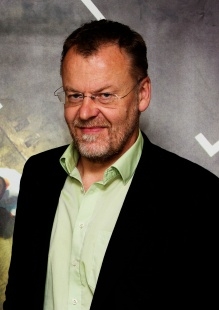Director
 Stefan Ruzowitzky
Stefan Ruzowitzky
Born 1961 in Vienna
Studied dramatics and history at the University of Vienna
Worked as a journalist for Austrian television
Stefan Ruzowitzky received the Max Ophüls Förderpreis 1997 for his cinema debut "Tempo" (1996). "Die Siebtelbauern" (1997/98) became an international festival success, won the "Tiger Award" in Rotterdam and was also present at the New York Film Festival. In 2000, over two million viewers in Germany alone were thrilled by the medical thriller "Anatomy" and "Hexe Lilli" became the most successful German children's film in 2009. The haunting concentration camp drama "Die Fälscher" celebrated its premiere at the Berlinale in 2007.
Filmography (Selection)
2011/2012: "Deadfall"
2007/2008: "Hexe Lilli - Der Drache und das magische Buch"
2006/2007: "Die Fälscher"
2002: "Anatomie 2"
2000/2001: "Die Männer ihrer Majestät"
1999: "Anatomie"
1997/1998: "Die Siebtelbauern"
1996: "Tempo"
Interview
You once said that the stories of your films always found you. So how did this story find you?
The film was made out of a defensive fight. The idea of making a documentary about the so-called Einsatzgruppen was brought to me – and I resisted it for a long time. I then said that if I did, I would approach such a project psychologically, with the approach of Christopher Browning, for example. I came across Browning's book "Ganz normale Männer" and similar works while researching "The Counterfeiters", and this psychological approach interested me. As a storyteller who is constantly practising applied psychology, I was fascinated by the attempt to find out why perfectly normal people could commit such horrible crimes. What mechanisms were at work that allowed a highly cultured people to drift so far into barbarism?
The perpetrators appear in detail in your film. Where do their statements come from?
The first time I was confronted with these statements was through Harald Welzer's book "Täter. Wie aus ganz normalen Familienvätern Massenmörder werden", and I found many other statements in other books and archives. We live in a time in which there are fewer and fewer contemporary witnesses. Contemporary witnesses are considered problematic in the science of history – and the longer back in time the things they report about, the more problematic it becomes. As a trained historian, I sometimes find it downright dubious how documentary allow very old people to talk about a long time ago, when they were still very young. But even if the perpetrators had still existed, they probably wouldn't have been willing to be interviewed – or at least they wouldn't have spoken as openly as in the minutes or in their letters and diaries at the time.
Is the concentration on the perpetrators and the renunciation of contemporary witnesses, of victims, also a conscious departure from a certain form of documentary?
Of course. Claude Lanzmann recently presented a new film in Cannes with an interview he did 40 years ago. But it is also in the nature of the subject. The terrible dimension of the crimes committed by the task forces is so little known because there are hardly any surviving victims who could report on it, unlike, for example, Mauthausen, Auschwitz or Dachau. The Einsatzgruppen moved from one village to another with military precision and killed all the Jews. That also appears in the film: there were no surviving Jews in Bibrka, all were massacred.